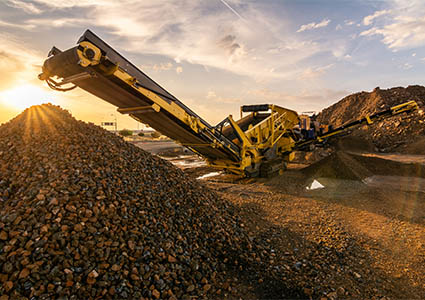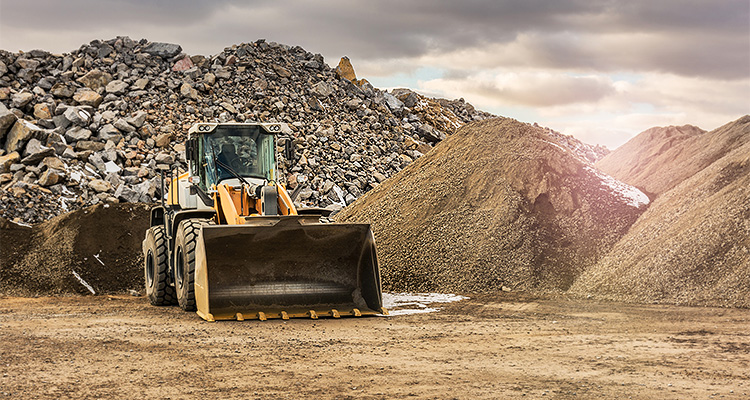The CEO of Johnsons Aggregates shares the importance of recycling the past to facilitate a better future
Founded in 1999, Johnsons Aggregates & Recycling (Johnsons) initially focused on the supply of quarried and recycled aggregates, site clearance, contract crushing and disposal of contaminated materials. As the energy-from-waste industry developed, the business recognised the potential for incinerator bottom ash (IBA) to be carefully blended with aggregate to provide a more sustainable, lower cost and higher quality product. As such, Johnsons developed its own unique plant in 2007 and has been operating from the site since. The valuable knowledge and experience gained has been used to develop what is widely considered the most advanced IBA recycling facility in Europe.
 “The business was founded by my father, Steve Johnson,” begins Lewis Johnson, CEO. “We process IBA by means of crushing, screening, sieving, and magnetic and non-magnetic separation. We recover ferrous metals, non-ferrous metals, and heavy metals and these are distributed globally to end users. The residue which now becomes incinerator bottom ash aggregate (IBAA), which is about 90 per cent of the input is then sold into construction markets and includes anything from road stones to fill sand. We have a range of unique products, and some generic ones as well. We’ve also got a haulage division and a metals processing division. The business has really grown over the last 25 years and is certainly very different today. We’ve grown from two employees to about 200 at our peak, pre-Covid. During the pandemic, a couple of contracts fell away, but we still have approximately 165 people working for us.
“The business was founded by my father, Steve Johnson,” begins Lewis Johnson, CEO. “We process IBA by means of crushing, screening, sieving, and magnetic and non-magnetic separation. We recover ferrous metals, non-ferrous metals, and heavy metals and these are distributed globally to end users. The residue which now becomes incinerator bottom ash aggregate (IBAA), which is about 90 per cent of the input is then sold into construction markets and includes anything from road stones to fill sand. We have a range of unique products, and some generic ones as well. We’ve also got a haulage division and a metals processing division. The business has really grown over the last 25 years and is certainly very different today. We’ve grown from two employees to about 200 at our peak, pre-Covid. During the pandemic, a couple of contracts fell away, but we still have approximately 165 people working for us.
“The IBA, which is the main core of the business now, feeds us with material. We process that material for clients and divert everything away from landfill. It’s against our company policy to send anything to landfill and I’m a strong believer in sustainability.
“In terms of our services, they range from haulage and merchant activities to IBA recycling. We recover metals, down to a tiny 200 microns in size. On the construction side, we crush, blend, and add demolition waste or quarried material as well, whether granite or limestone, to produce some of our unique products. Our best-selling is a low carbon type that performs the same as quarried material, however it’s a fraction of the price and a fraction of the CO₂ per ton. From site stripping to advisory services, there are a range of other intricacies that we can offer,” he elaborates.
Sustainability strategies
Lewis goes on to share further details of Johnsons’ commitment to sustainability strategies. “In 2023, we spent just under £1 million putting solar panels on two of the main factory roofs to reduce reliance on the grid. We also operate the latest fleet of trucks and remain up to date with changes in technology to enhance energy efficiency. Construction is notorious for emissions. As such, we assess our products’ emissions and are increasingly striving to share those details with prospective clients. Many are placing increasing value on reducing the environmental impact of their projects, so we are aiming to present a more attractive proposition in terms of the environmental impact of our products.
“We’re investing in hydrogen technology for some of our trucks and have been told by the manufacturer that we can have them by the end of 2026. We have also got electric cars in the fleet, so we’re certainly trying to do our bit to improve the industry’s position. If we can, we’ll arrange deliveries to customers, for example, to reduce journeys and their associated carbon footprint.”
Another area of operations on which Lewis is particularly focused is safety. Johnsons is currently rolling out the latest generation Wheely-Safe technology across its fleet of eight-wheel tippers to improve the efficiency and health and safety of its operation. The in-motion wheel loss detection system, which combines brake and hub temperature monitoring with an intelligent tyre pressure monitoring system, is being rolled out on 25 of its Scania trucks. Mick Glenny, Transport Manager adds: “We’re doing a lot of off-road work and delivering into incinerator facilities can incur hub overheating. The fact that the system monitors any abnormality in that area is a huge benefit to us. With the data the technology provides, we should be able to identify the cause of any issues too which will help us ensure similar problems don’t arise again. It just gives you huge peace of mind.”
fleet of eight-wheel tippers to improve the efficiency and health and safety of its operation. The in-motion wheel loss detection system, which combines brake and hub temperature monitoring with an intelligent tyre pressure monitoring system, is being rolled out on 25 of its Scania trucks. Mick Glenny, Transport Manager adds: “We’re doing a lot of off-road work and delivering into incinerator facilities can incur hub overheating. The fact that the system monitors any abnormality in that area is a huge benefit to us. With the data the technology provides, we should be able to identify the cause of any issues too which will help us ensure similar problems don’t arise again. It just gives you huge peace of mind.”
Bigger and better
In terms of recent projects, Lewis shares that the business has been successful in a recent bid to take waste from Birmingham, in The Midlands. “It’s a 100,000-ton-a-year project for 15 years and will help to prevent about 450,000 tons a year from going to landfill. We’ll recover metals and aggregates from the process, recover the value and recycle them back into the system. A product like aluminium, for example, is endlessly recyclable, so if you have a ton of aluminium today and you process it and recycle it, you’ll have a ton of aluminium tomorrow and the next day and the next.”
While Johnsons may be celebrating its 25th anniversary, Lewis asserts that the team won’t be slowing down any time soon with new projects in the pipeline to be managed. “We will of course be celebrating. It’s crucial to look after your staff because without a strong team to deliver goals, there is no business. Looking to the future, over the next five years or so, I hope to be doing what we are doing now, but bigger and better. I know that’s a generic statement, but what I mean by bigger is processing more of the same waste and what I mean by better is doing the job that we’re doing now, but more efficiently. We’re also on year three of our carbon reduction plan, and our emissions are reducing massively year-on-year. So, we’re heading in the right direction.
“The industry is becoming more aware of its presence and what it can do collectively. If every project had a carbon score and an associated tax, I think that would drive the behaviour of everyone in the market to become greener. As an industry, we need to invest in the best technology to do the job as efficiently as possible. There is a lot of good happening in the sector currently,” he concludes, “and it’s important for the industry to balance profitability with environmental impact to ensure a sustainable sector moving forward.”
